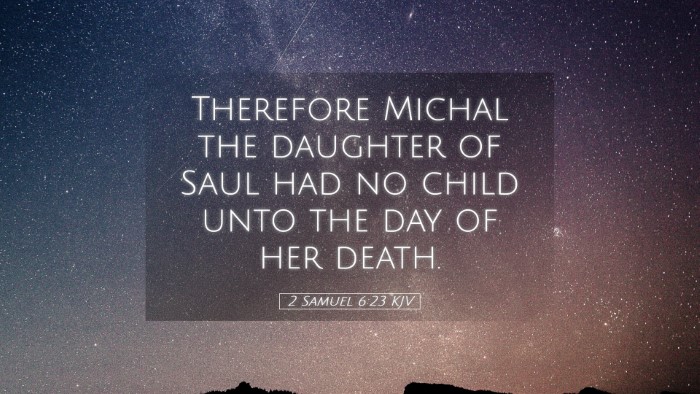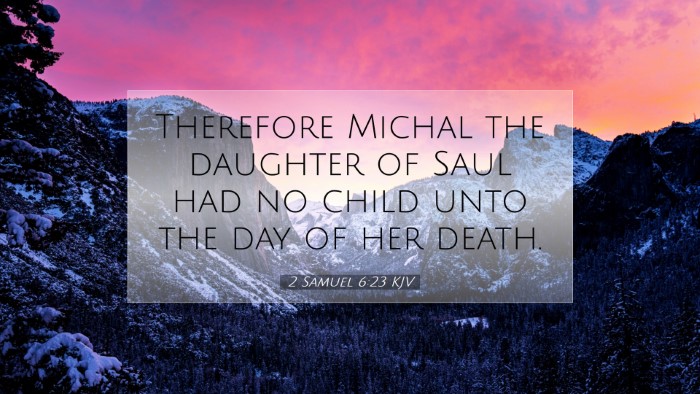Commentary on 2 Samuel 6:23
“Therefore Michal the daughter of Saul had no child unto the day of her death.” (2 Samuel 6:23, KJV)
Introduction
This verse concludes the narrative of David’s joyous procession of the Ark of the Covenant into Jerusalem. Michal, the daughter of Saul and David’s wife, plays a pivotal role in this story, particularly in how her actions and attitudes lead to a profound consequence in her life. This commentary aims to explore the theological, historical, and practical implications of this verse, drawing insights from esteemed scholars including Matthew Henry, Albert Barnes, and Adam Clarke.
Contextual Background
The backdrop of 2 Samuel 6 is essential for understanding the verse's significance. David, as king, desires to bring the Ark of the Covenant to Jerusalem, symbolizing God’s presence among His people. This movement is marked by joy, worship, and dancing, contrasting with Michal’s disdain for David's exuberance. The chapter depicts a spiritual restoration and the centrality of the Ark in Israel's worship.
Analysis of Michal's Action
Matthew Henry comments on Michal’s reaction to David’s worship, underscoring her contempt for his unrestrained display of joy. She viewed his actions as undignified, reflective of her royal upbringing. Yet, this attitude revealed a disconnect with the true worship ethos that David demonstrated.
In contrast, David’s actions symbolize a heart devoted to God, unencumbered by the expectations of human decorum. The author poignantly observes that Michal’s shame in David’s behavior is emblematic of a deeper spiritual crisis. Albert Barnes succinctly notes that Michal sees David dancing “before the Lord” as something beneath the dignity of the king, failing to recognize the sacredness of David’s worship.
Theological Implications
This verse reveals significant theological truths, particularly regarding the consequences of pride and scorn in worship. Adam Clarke suggests that Michal’s bitterness towards David stemmed from her unfulfilled ambitions and perhaps jealousy over his popularity and devotion. Her attitude is a stark warning about the perils of prioritizing personal pride over God’s glory.
- Divine Displeasure: Michal’s scorn leads to God’s judgment, resulting in her barrenness, highlighting how God responds to attitudes that reject His glory in favor of human vanity.
- The Role of Women in Worship: Her position as Saul’s daughter represents a complicated legacy; while she occupies a significant status, her failure to support David signifies a critical disconnect with the true heart of worship.
- Contrast Between Human and Divine Standards: David’s worship is celebrated by God, while Michal’s dismissive view reflects human standards that often conflict with divine expectations.
Consequences of Michal's Actions
The decisive outcome of Michal’s disdain for David’s worship is pronounced in the passage: she remained childless until death. Henry remarks on the solemnity of this judgment, as it marks the end of her lineage and a perpetual state of barrenness, serving as a divine reminder of the consequences of dishonor towards God’s anointed.
This barrenness can be interpreted as a multifaceted consequence: it not only signifies a physical inability to bear children but also reflects a spiritual barrenness due to her rejection of true worship. Michal's failure to engage with the worshipful atmosphere symbolizes a deeper estrangement from God’s purposes.
Lessons for Modern Believers
2 Samuel 6:23 offers profound lessons relevant for contemporary Christians:
- Authenticity in Worship: The passage encourages believers to engage in worship with authenticity and abandon, free from societal constraints and expectations.
- The Heart Attitude: It underscores that worship is ultimately about the heart's posture towards God. Joyful, sincere worship aligns one's spirit with God's presence, whereas disdain can lead to spiritual desolation.
- Legacy and Influence: Believers must consider the long-term impacts of their attitude toward God’s work, as they influence not only their relationship with God but also those around them.
Conclusion
In conclusion, 2 Samuel 6:23 serves as a poignant reminder of the importance of worship, heart attitudes, and the consequences of our actions towards God and His appointed leaders. Michal’s story invites reflection on our own engagement with the divine and encourages a posture of humility and reverence for God’s presence among His people. As David danced before the Lord without restraint, may we likewise cast aside our inhibitions and embrace the joy of worship, understanding its eternal significance in our lives and communities.


